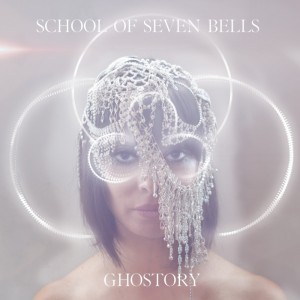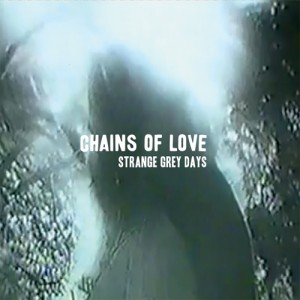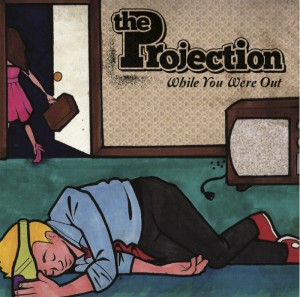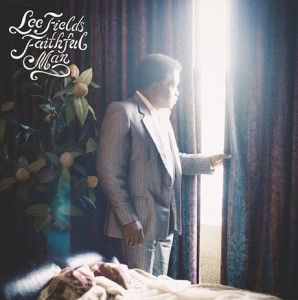School of Seven Bells
Ghostory
(Vagrant/Ghostly)
4/5
School of Seven Bells, a dream-pop indie-rock shoegaze band from New York, are back with their third studio album. This band is adorable: their songs draw you in and feel like comfortable dreams, the kind you never want to end.
Recently, School of Seven Bells downgraded in size, becoming a duo consisting of Alejandra Deheza and Benjamin Curtis. Alejandra’s biological twin, Claudia, left the band in 2010. (So, officially, the band is still genetically the same.)
Most of the band’s lyrics read like poetry, instead of traditional shoegaze music that has a tendency to use vocals as another layer of sound. This is because of School of Seven Bells’ unique songwriting style, in which the lyrics are formulated first and then are only supplemented by the music.
Which isn’t to say the music isn’t worth exploring, because it is; the vocals and lyrics are simply the extra element that pushes this one above good and into great.
-Clorisa Simpson
Chains of Love
Strange Grey Days
(Dine Alone)
3.5/5
Strange Grey Days is a promising debut from Vancouver’ Chains of Love. The album bursts out of the gate in stunning fashion, with dense, soulful rockers. “He’s leaving (with Me)” and “All the Time” display rhythmic chemistry between bassist Brian Nichol and drummer Steve Ferreira.
The third and fourth tracks are an inexplicable shift from the darker sound of the first two. The atmosphere established by the opening tracks is all but abandoned in favour of two pop numbers heavily steeped in the influence of Fleetwood Mac. This lack of focus rudely interrupts the listening experience.
The album picks up steam once more on the sixth track, “Lately,” with some truly inspired keyboards. Henry Beckwith’s playing here is reminiscent of the psychedelic stylings of Ray Manzarek.
Although the band shows a lack of focus, Strange Grey Days is a fresh and compelling record that gives off a heavy retro vibe.
-James Down
The Projection
While You Were Out
(Paramount Drive)
1.5/5
While You Were Out is the second album by Chicago pop-punk trio the Projection. The album begins in lackluster fashion with the title track and “Cross the Line.” The band establishes the album early as commercially conscious, generic pop-punk.
While the first three tracks offer nothing notable, the fourth track, “Always Remember,” is notably awful. This insipid, cliché-drenched ballad is like a Blink-182 song sloppily played by a far less confident band.
Drummer Colin Benoit saves While You Were Out from being a complete throwaway. His chugging, powerful rhythms carry his far weaker bandmates. He’s the one strong point in an album rife with uninspired, bland music, childish lyrics, and tired themes.
While You Were Out will be filling record store bargain bins come the end of the month.
-James Down
Brett Wildeman
Portraits
(independent)
2.5/5
On Portraits, Brett Wildeman delivers five quiet, slow, nature-y songs so lulling they might just put you to sleep. The album starts fairly promisingly with “Midnight Snack,” but even this moderately chipper folk tune soon dissolves into repetition.
The instrumentation is fairly sparse; most songs start with acoustic guitar and Wildeman’s vocals; they also include percussion, strings, backing vocals, and lap steel guitar (the best part of the album).
Wildeman’s voice is croaky but kind, and he often breaks up words in odd places (“under nigh-t-fall rats will bu-ry”), giving his vocals a stilted cadence.
There’s a distinct nature feel to this album. It evokes wood cabins next to the ocean, and indeed the album closes with three minutes of ocean sound. Just the thing to put you to sleep.
-Rose Jang
Lee Fields & The Expressions
Faithful Man
(Truth & Soul Records)
3.5/5
Dim the lights, pull out a cigarette, pour yourself a rum and coke, and lie back into the slow, measured soul of Lee Fields & The Expressions’ latest offering, Faithful Man. This album starts off strong with the energetic, insistent “Faithful Man,” but the rest of the album is slow jam after nostalgic slow jam.
Soul is all about emoting, and Fields has that down pat (as he should after a 40-plus year music career). Unfortunately, his yearning singing style can make the listener long not for love but for an instrumental number.
The Expressions are truly the best part of any Fields album: they are always solid and temper Fields’ wailing, almost desperate, vocal style with their groovy arrangements.
Faithful Man is no party-starter, but it’s just the right album for a chill night in, dreaming of the ’60s.
-Rose Jang





